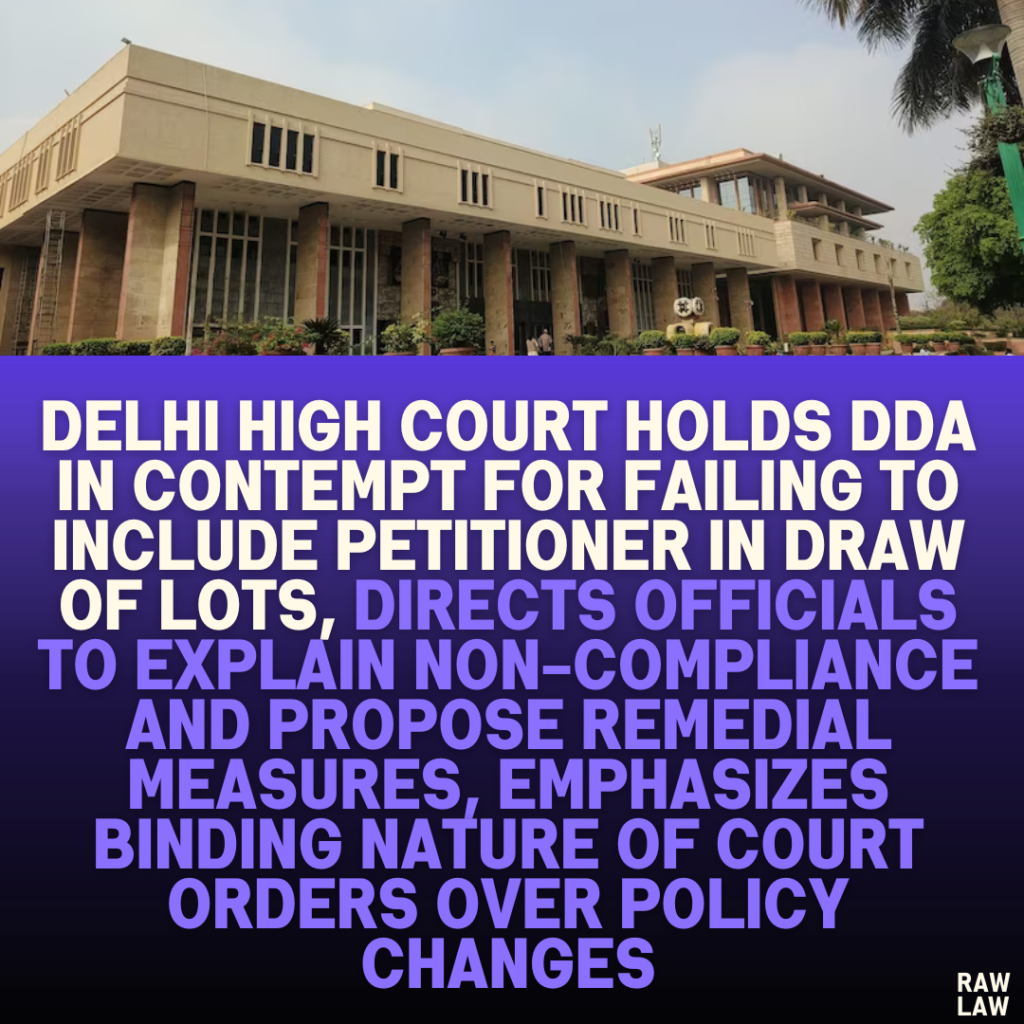Court’s Decision
The Delhi High Court held the Delhi Development Authority (DDA) in contempt for willfully and deliberately defying its directions issued on December 21, 2015. The Court found that the DDA failed to include the petitioner’s name in the next draw of lots within the stipulated three months. The Vice Chairman and Director (Land Disposal) of DDA were directed to personally appear or join via video conferencing to provide explanations for the non-compliance and propose measures to rectify the contempt.
Facts
- The petitioner’s late father was the recorded owner of a 1/8th share in land located in village Kakrola, New Delhi, which was acquired by the Delhi Government in 1994 for planned development.
- Under the Dwarka Residential Scheme, an alternative plot of 80 square yards was recommended for allotment to the petitioner’s father in 2007 by the Land & Building Department.
- After the father’s death in 2008, the legal heirs executed a relinquishment deed in 2012, transferring their rights to the petitioner.
- The petitioner informed DDA of the change and requested inclusion in the seniority list for the next allotment draw. Although his name was initially listed, it was later excluded.
- Aggrieved by this exclusion, the petitioner filed W.P.(C) 2926/2013, resulting in a High Court order dated December 21, 2015, directing the DDA to include the petitioner in the next draw within three months.
- Despite several reminders, the petitioner’s name was not included, prompting the filing of the present contempt petition.
Issues
- Whether the DDA’s failure to include the petitioner in the next draw constituted contempt of the High Court’s order dated December 21, 2015.
- Whether the DDA’s internal policies could override the Court’s specific directions.
Petitioner’s Arguments
- The petitioner claimed that DDA’s failure to act on the court’s directions deprived them of their rightful allotment, causing undue hardship.
- Pointed to inconsistencies and delays in the DDA’s affidavits, suggesting irregularities in the plot allocation process.
- Cited legal precedents to assert that a registrant cannot be penalized due to administrative failures or policy changes.
Respondent’s Arguments
- DDA argued that no draw could be conducted for 80-square-yard plots due to unavailability.
- Submitted affidavits asserting that policy changes—such as declaring Dwarka as a developed area—restricted alternative allotments in that region.
- Claimed to have communicated with its Planning Branch to carve out plots for allotments and cited efforts to comply with the Court’s directions.
Analysis of the Law
- The Court highlighted that a clear statement by DDA’s counsel during earlier proceedings formed the basis of the High Court’s order directing the petitioner’s inclusion in the next draw.
- Policy changes, including decisions made by the DDA’s Screening Committee in November 2015, could not override the binding nature of the Court’s order issued in December 2015.
- Administrative resolutions, such as allotting alternative plots only in Narela, were not applicable as they were made prior to the Court’s order and were inconsistent with it.
Precedent Analysis
- Ram Kumar v. DDA:
- Upheld substitution of alternative plots in Narela due to unavailability in Dwarka.
- Emphasized the legitimacy of policy changes when implemented transparently.
- Atter Kaur v. DDA:
- Held that registrants cannot suffer due to administrative lapses by DDA.
- Ram Nath v. DDA:
- Affirmed that petitioners should not bear the consequences of delays or discrepancies within the DDA’s processes.
Court’s Reasoning
- Defiance of Court Directions:
- The Court found that 67 plots of 80 square yards were available in Dwarka as of December 21, 2015, contrary to DDA’s claim of unavailability.
- Failure to conduct the draw within the stipulated period constituted willful disobedience.
- Inconsistent Positions:
- DDA’s affidavits revealed shifting justifications for the delay, including claims of policy constraints and unavailability.
- These inconsistencies undermined DDA’s credibility.
- Accountability:
- The Court emphasized that DDA’s commitment made during the proceedings formed the basis of its order, which was binding irrespective of later policy decisions.
- Arbitrariness:
- The Court found DDA’s actions arbitrary and lacking transparency, noting that similar petitioners had been allotted plots through mini draws in 2013.
Conclusion
The Delhi High Court concluded that the DDA was in contempt of its order and directed the Vice Chairman and Director (Land Disposal) of DDA to appear and explain the non-compliance. The officials were also tasked with presenting remedial measures to purge the contempt.
Implications
- Reinforcement of Judicial Authority:
- Highlights the binding nature of court orders on public authorities, irrespective of subsequent policy changes.
- Accountability for Public Bodies:
- Encourages administrative bodies to act transparently and comply promptly with judicial directives.
- Precedent for Future Cases:
- Sets a clear standard that internal administrative resolutions cannot supersede court orders, ensuring fairness in allotment processes.



